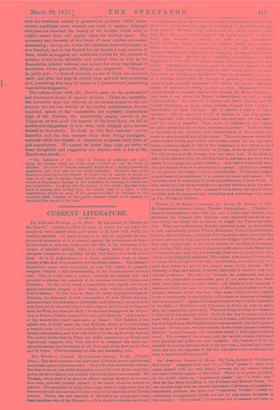Two Worlds of Fashion. By Calthorpe Strange. 3 vols. (Tinsley
Bros.)—The most nauseous and.shameless of French novels profess and even trade upon a certain morality. They will often describe the retribu- tion that waits on visa, -while they paint vice itself with all-the seductive power, all.the brilliancy and warmth which their pens can.command. Mr. Strange, whose book is as great an offence against decency as we have ever seen, probably justifies himself by the moral which he intends to enforce. - We can hardlybe doing him wrong when we conjecture that he borrows not only his method, but also much of his material from French sources. Surely the last sentence of the. following paragraph comes from the ether side of the Channel s—" It is doubtful whether the breast
of a young man given up to the sole pursuit of pleasure is over touched by the tire of real love ; but once so touched, it is thenceforward safe from illusion. Between a true passion and the empty emotions that may for a time pass by its name, it will never again b3 in doubt. Love then becomes a saviour as well as an atonement."
Lord Caorleon, w-horn, though the author might not arknow- ledge the justice of the description, we may call a profligate young nobleman, finds himself. after a desperate encounter with a boar,
in a Swiss cottage. His first art ef returning consciousness is to fall hopelessly in love with two young women, his hostess's daughter and maid. "Marguerite's loveliness spoke to the heart. Marie's to the sense." The young lord, who, though he had "drank down to the very lees of the art of luxurious indulgence," was, we are assured, not-a roue
or a libertine, shows what Mr. Strange is pleased to call his "noble instincts and generous sentiments" by ruining Marguerite Mario he
shoots by mistake in trying to shoot a rival. Marguerite tries to drown herself, is rescued, marries her rescuer, Sir Hubert Dslinight, and bears a son, whom Sir Hubert acknowledges, but who is really Lord Caerleon's. An interval of twenty odd years elapses, and Sir Gerald Dalbright, as he is called, presents himself with a lettsr of introduction to Lord Caerleon. He is offered a choice of intro- ductions; will he enter -the world of fashion, or the deni-monde He expresses with revolting frankness his preference for the latter,, and his wish is gratified. Then there -is inflicted on the -reader, in odious detail,- the life of -these creatures- of pleasure. Lord Cfterleon is horrified at the cynicism and shamelessness of his protege; and seeks in vain to check him in, his course. The min.remorse which this- sight awakes inhim, and which drives him-.when his eon has been made a helpless cripple for life by the vengeance of one whom ho-had sought to wrong—into the order of La Trappe, is the moral of the tale. We will-not say that Mr. Strange does not mean well. If he doessho will not-he offended when we tell him that he has taken the very worst means for carrying out a good intention. Any reader-whom this novel does -not disgustlit must do something:to corrupt. That' it:can possibly do any good to any human-being is inconceivable. To the good, feeling or good taste of the.pulslishars it is useless- to make: any appeal. The librarians may do something to cheek the publication of such ,books. If they would not buy these worthless or-nominees books at, some lonsprieo, to serve as padding for their customeri-book-boxess -we .should not: ho- troubled with the nauseous task of reading.and- reviewing such books as Tao Worlds of Fashion.






































 Previous page
Previous page